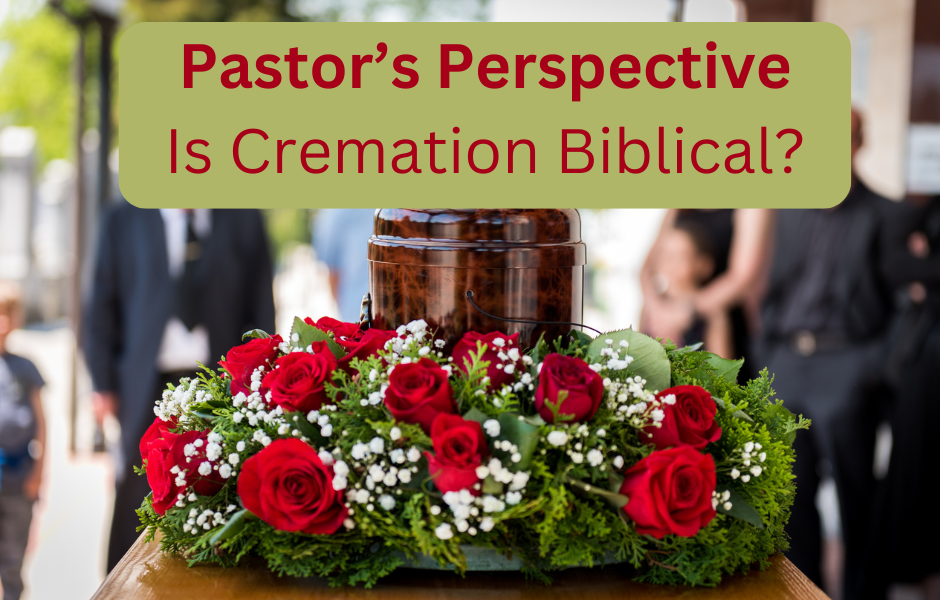This question came to me in this exact wording on August 8th, 2024.
There has been a trend in the last several years of people choosing cremation for themselves or their loved ones upon their passing. How to treat the remains of the deceased is something filled with all kinds of concerns, from practical to personal.
One reason many are choosing cremation these days is financial. It is normally much less expensive to cremate than to have a traditional burial. A burial comes with the price of a casket, a larger space necessary to bury it, and other expenses depending on what services are purchased from the typical funeral home.
There is no definitive command in the Bible concerning whether to bury or cremate, but some form of burial is the long-standing tradition. In Bible times the custom was to bury the dead quickly because the warmer temperatures in Israel brought faster decomposition. Those who could afford it, usually had rock-hewn tombs or caves in which they would deposit the dead. The poor used graves dug in the dirt, covered with stones. Jewish oral tradition, recorded in a collection of rabbinic writings known as the Mishnah, forbade cremation as idolatry.
The Christian tradition has also leaned toward burial. Much of this has to do with the doctrine of resurrection from both the Old and New Testaments (Dan 12:2; Jn 5:28-29). Burial has been viewed in light of the resurrection. In fact, the New Testament refers to death as “sleep” several times, recognizing that there will be a resurrection (1 Thess 4:13; Jn 11:11-14; 1 Cor 15:51). At death the soul is separated from the body. If the deceased is a believer, his or her soul goes into God’s presence in paradise. The body decays. Yet, it is only thought of as sleep because a resurrection of the body is expected at some future point. In the resurrection the soul is reunited to the body which has been restored and glorified.
In this regard, the English word “cemetery” derives from a Greek word that means to sleep. The graveyard is thought of as a place where dead bodies sleep until the resurrection. Also, burial may be thought of as symbolizing our identification with Christ, who was buried in a tomb (“and that He was buried,” 1 Cor 15:4).
For this reason, many Christians favor burial over cremation. There are many examples of burial in Scripture (Gen 23:9; 50:25; Deut 34:5-6; Mk 6:29; Lk 16:22; Jn 11:17-19; Acts 5:6-10; Mk 15:46). Yet these are descriptions of what was done, not instructions for what should be done. Perhaps the strongest argument for burial is that it seems to align better with Christian theology concerning the afterlife.
Another factor to consider is that burning the body was prescribed in some cases for the treatment of criminals (Lev 20:14; 21:9; Josh 7:25). There is also the Bible’s negative portrayal of fire, as in the fire of hell (Matt 5:22; 18:9; Jms 3:6; Rev 14:10; 19:20; 20:10, 14, 15; 21:8). These factors are compelling for many Christians who strictly hold to burial as the most biblical approach.
Others believe this issue is not as spiritually important. Genesis 3:19 says, “By the sweat of your face you shall eat bread, until you return to the ground, because from it you were taken; for you are dust, and to dust you shall return.” A dead body is destined to rot and disintegrate into the earth. Ashes share the same destiny.
There are also some interesting questions that must be considered. If God is able to restore a totally decomposed body from a grave, is He not able to restore a body from ashes? What about military members who have been vaporized in combat? What about sailors who have perished at sea? What about an organ donor whose heart and liver have been given to different people? Actually this line of questioning could be taken to absurd levels. The point is, God is able to resurrect from a traditional grave or from ashes.
So, with all this in mind, how should a Christian approach this issue? First, if the wishes of the deceased are known, this must be respected. Second, if being consistent with the pattern found in Scripture (and in line with long-standing Christian tradition) is important for you, then burial would seem to be the best approach. Yet I see nothing that directly commands burial. Nor do I think cremation is a sin.
Bottom line, I would say burial is, perhaps, a better witness to what biblical theology really teaches. Yet, cremation is not forbidden. God is able to raise us up in glory from either position.

